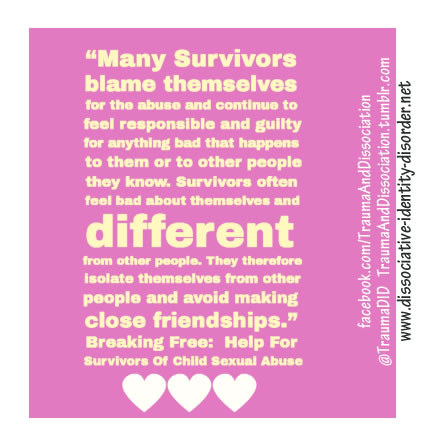Do survivors of abuse blame themselves for being abused?
One survivor, who was sexually abused and exploited by a pedophile ring in Rochdale, England stated:
“Slowly, I’m beginning to realise that what happened to me wasn’t my fault, that I was taken advantage of by a group of vile, twisted men. Girl A, Girl A: The truth about the Rochdale sex ring by the victim who stopped them.
Survivors of child abuse are even likely to blame themselves than survivors of abuse as an adult, in particular when they were groomed by an abuser. Psychoeducation can help reduce; reviewing the events leading up to the abuse from a new, adult point of view can be key to shifting the self-blame.
The experience of talking about my life in that period was really difficult. I started to remember how I had felt at the time but through the eyes of a now adult.
I felt very low and my self-esteem was at its lowest. I felt that what happened was my fault and that I deserved to be treated that way. I sometimes struggled during the interview process because I found myself getting upset and angry. I was upset because I could see looking back how easily I was led by people that I thought actually cared about me at the time. I can see now that they didn’t care about me. They wanted me for their sexual pleasure.”
‘Girl A’ from her victim impact statement, 9 men from the pedophile ring who abused her were jailed
Is posttraumatic stress disorder linked to self-blame and guilt?
One of the core symptoms needed for diagnosing PTSD is negative alterations in cognitions and mood associated with the traumatic events(s), beginning or worsening after the traumatic event(s).
The DSM-5 diagnostic manual breaks this down into several examples, some of which include the individual blaming himself/herself, and persistent guilt, shame, fear and anger.
Read more about PTSD.
Sexual Abuse and Child Sexual Abuse – How does it happen?
Child sexual abuse is not spontaneous or “accidental” in any way.
Breaking Free: Help for survivors of child sexual abuse, Carolyn Ainscough & Kay Toon
Understanding how the psychology and pattern of behavior of an abuser before the abuse began can help alter this perspective by helping a survivor see this from a more neutral point of view.
Related articles
- Trauma and Abuse (traumadissociation.com)
- What’s Trauma Bonding, is it linked to child abuse, complex PTSD and Stockholm syndrome? (traumadissociation.wordpress.com)
- Safety and Privacy Tips for survivors of abuse: Facebook and social networking (traumadissociation.wordpress.com)
- The Abused Inner Child (boundariesofthesoul.com)
- CEOP- introduction, statistics and key treat areas for 2013/2014 (safeguardingonline.wordpress.com)
- Child sexual abuse victims need our support, not blame (brstarcenter.wordpress.com)
- 5 Things Never to Say to a Survivor of Abuse (survivingyesterday.wordpress.com)
- Book review: A secret safe to tell (traumadissociation.wordpress.com)
- Denial: A psychological defense against trauma (traumadissociation.wordpress.com)
- Prevention of sexual abuse: what helps (DiscussingDissociation.com)


Pingback: Sexual Abuse and Child Sexual Abuse – it planned or spontaneous? | Trauma and Dissociation
Pingback: We can let go and still hold onto ourselves: Singing a Song | Trauma and Dissociation
Pingback: Where does low self-esteem come from? Does it effect health? | Trauma and Dissociation
Pingback: Blog For Mental Health 2014 – fighting stigma together | Trauma and Dissociation
Pingback: Being male and a survivor | Trauma and Dissociation Project
Pingback: Child Protection and Disclosure: Ten reasons I didn’t tell I was being abused | Trauma and Dissociation